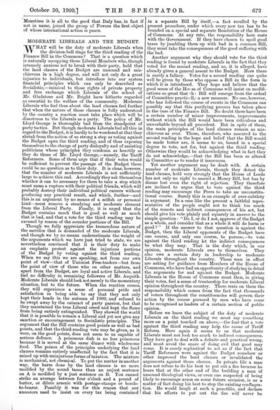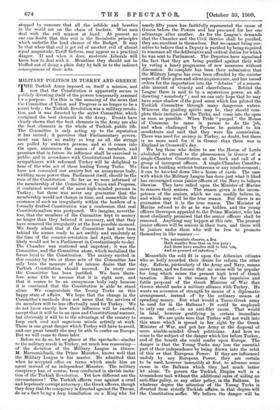MODERATE LIBERALS AND THE BUDGET.
WHAT will be the duty of moderate Liberals when the division-bell rings for the third reading of the Finance Bill in the Commons ? That is a question which is naturally occupying those Liberal Members who, though intensely anxious not to break with their party, hold that the land clauses of the Budget are unsound and. mis- chievous in a high degree, and will not only do a great injustice to individuals, but introduce into our system financial principles which can only be described as Socialistic,—inimical to those rights of private property and free exchange which Liberals of the school of Mr. Gladstone and Mr. Bright have hitherto regarded as essential to the welfare of the community. Moderate Liberals who feel thus about the land clauses feel further that when the nature of those clauses is fully understood by the country a reaction must take place which will be disastrous to the Liberals as a party. The policy of Mr. Lloyd George is thoroughly bad from the standpoint of party tactics. But though moderate Liberals feel all this in regard. to the Budget, it is hardly to be wondered at that they shrink from the notion of so strong a step as voting against the Budget upon the third reading, and of thus exposing themselves to the charge of party disloyalty and of assisting politicians whose principles they condemn as heartily as they do those of Mr. Lloyd George,—namely, the Tariff Reformers. Some of them urge that if their votes would be sufficient to prevent the passage of the Budget there could be no question as to their duty. It is clear, however, that the number of moderate Liberals is not sufficiently large to achieve this end. Accordingly they ask themselves whether it can be necessary for them to take a step which must mean a rupture with their political friends, which will probably destroy their individual political careers without producing any practical result, and which, further—and this is an argument by no means of a selfish or personal kind—must remove a steadying and moderate element from the Liberal Party. Finally, it is urged that the Budget contains much that is good as well as much that is bad, and that a vote for the third reading may be excused by reason of the sounder portions of the Bill.
Though we fully appreciate the tremendous nature of the sacrifice that is demanded of the moderate Liberals, and though we by no means underestimate the weight of the arguments which we have just tried to state, we are nevertheless convinced that it is their duty to make an emphatic protest against the injurious portions . of the Budget by voting against the third. reading. When we say this we are speaking, not from our own point of view—that of Unionist Free-traders—but from the point of view of those who on other matters, and. apart from the Budget, are loyal and active Liberals, and. • feel no difficulty in remaining followers of Mr. Asquith. Moderate Liberals should. look not merely to the momentary situation, but to the future. When the reaction comes, they will experience a sense of personal pride and satisfaction in being able to say that they not only • kept their heads in the autumn of 1909,-and refused to be swept away by the cataract of party passion, but that they maintained the true Liberal creed and kept the flame • from being entirely extinguished. They showed the world , that it is possible to remain a Liberal and yet not give any sanction or encouragement to Socialistic principles. The • argument that the Bill contains good. points as well as bad points, and that the third-reading vote may be given, as it were, on the good points, does not seem to us capable of serious defence. A poisonous dish is no less poisonous • because it is served at the same dinner with wholesome food. The poison of the principles underlying the land clauses remains entirely unaffected by 'the fact that it is mixed up with uninjurious forms of taxation. The mixture is mechanical, not chemical. To put the matter in another way, the harm done by the land clauses is no more modified by the sound taxes than an unjust sentence on A is modified by a just sentence on B. You cannot strike an average between four o'clock and a pound of butter, or dilute arsenic with postage-stamps or bonds- to-bearer. Possibly it was for this reason that our • ancestors used to insist on every tax being contained in a separate Bill by itself,—a fact recalled by the present procedure, under which every new tax has to be founded on a special and separate Resolution of the House of Commons. At any rate, the responsibility here rests with the Government. If they have chosen to spoil good taxes by jumbling them up with bad in a common Bill, they must take the consequences of the good suffering with the bad.
Another argument why they should vote for the third reading is found by moderate Liberals in the fact that they voted for the second reading, and so, it is alleged, have already given a general assent to the Budget. Here there is surely a fallacy. Votes for a second reading can quite well be given by those who oppose a Bill in the form in which it is introduced. They hope and believe that the good sense of the House of Commons will insist on modifi- cations so great that Ih -3 Bill will emerge from the ordeal of Committee practice fly a new measure. No one, however, who has followed the course of events in the Commons can possibly say that this purifying process has taken place in the case of the Finance Bill. No doubt there have been a certain number of minor improvements, improvements without which the Bill would. have been ridiculous and. unworkable beyond all precedent. But in spite of these, the main principles of the land clauses remain as mis- chievous as ever. Those, therefore, who assented to the second reading in the hope and belief that the Bill would be made better are, it seems to us, bound in a special degree to vote, not for, but against the third reading. Otherwise they would be acknowledging what in fact they do not acknowledge,—that the Bill has been so altered in Committee as to render it innocuous.
Yet another argument may be dealt with. A certain number of moderate Liberals, though they detest the land clauses, hold very strongly that the House of Lords has not only no right to amend a Money Bill, but has by disuse lost even the right of rejection. They therefore are inclined to argue that to vote against the third reading may encourage the Peers to take an unconstitu- tional course. Surely this is an example of over-subtlety in argument. In a case like the present a faithful repre- sentative of the people ought not to think too much of the remote and indirect consequences of his act, but should give his vote plainly and squarely in answer to the simple question : "Do I, or do I not, approve of the Budget as a whole, and. consider that as a whole it will do harm or good ? " If the answer to that question is against the Budget, then the Liberal opponents of the Budget have one course, and. only one course, to pursue,—to vote against the third reading let the indirect consequences be what they may. That is the duty which, in our opinion, moderate Liberals owe to themselves. They also owe a certain duty in leadership to moderate Liberals throughout the country. These men in effect are asking for guidance from Members of the House of Commons, who have had an opportunity of studying in detail the arguments for and against the Budget. Moderate Liberals in the House of Commons must then, in giving their votes, feel a sense of trusteeship for moderate Liberal opinion throughout the country. There rests on them the responsibility which comes from the fact that thousands of voters throughout the constituencies will govern their action by the course pursued by men who have come to be recognised as leaders of s certain section of public opinion. Before we leave the subject of the duty of moderate Liberals on the third. reading we must say something more on a point touched on above,—the fear that a vote against the third reading may help the cause of Tariff Reform. Here again it seems to us that moderate Liberals must not look too much to indirect consequences. They have got to deal with a definite and practical wrong, and must avoid the snare of doing evil that good may come. It is surely sophistical to act as if the fact that Tariff Reformers were against the Budget somehow or other improved the land clauses or invalidated the arguments against those clauses. In private life a man does not refuse to do his best to put out a fire because he hears that at the other end of the building a man Of unsound theological views, or even one suspected of being likely to encourage arson on some future occasion, is as a matter of fact doing his best to stop the existing conflagra- tion. He would. laugh at such a punctilio, and declare that his efforts to put out the fire will never be stopped by rumours that all the infidels and heretics in the world are on the chain of buckets. Wise men deal with the evil nearest at hand. At present no one can doubt that this evil is the Socialistic principles which underlie the land clauses of the Budget. It may be that when that evil is got rid of another evil of almost equal magnitude, Tariff Reform, may appear as a practical danger. If and when it does, moderate Liberals will know how to deal with it. Meantime they should not be bluffed out of doing a plain duty by talk as to the indirect consequences of their acts.











































 Previous page
Previous page